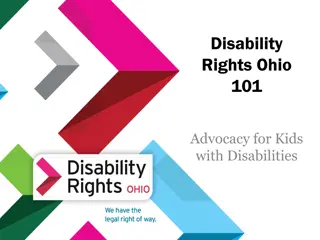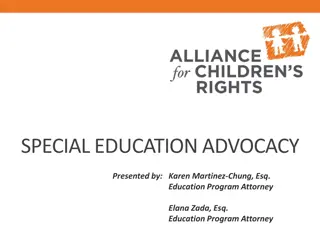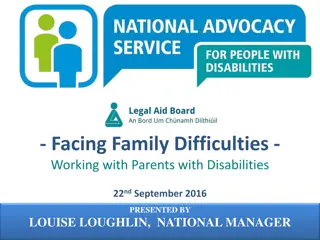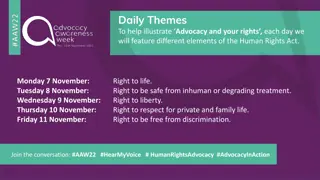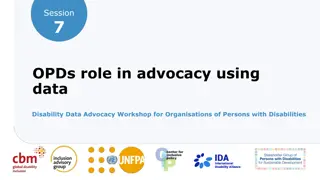Empowering Parents in Special Education: Advocacy and Legal Rights Explained
Learn how to effectively advocate for your child in special education, understand the laws governing special education, know your rights, and access resources for support. Discover the importance of being organized, persistent, and informed in navigating the system.
Download Presentation

Please find below an Image/Link to download the presentation.
The content on the website is provided AS IS for your information and personal use only. It may not be sold, licensed, or shared on other websites without obtaining consent from the author. Download presentation by click this link. If you encounter any issues during the download, it is possible that the publisher has removed the file from their server.
E N D
Presentation Transcript
Special Education Explained Virginia Spencer Lumen Advocacy LLC info@lumenadvocacy.com 630-251-5658 @makeSPEDbetter 10/26/2017 1
Today, well cover Introduction How you can be an effective advocate Definition of the laws that address special education 504 Services Individual Education Plans How to request services Tips for IEP Meetings Where to get help 10/26/2017 2
The facts You are the expert when it comes to your child No one will want what s best for your child more than you do School districts answer to school boards who don t know your child Services are expensive, so districts may try to limit the amount of services they offer Schools are not required to give the best education; just an appropriate one 10/26/2017 3
How can you be an effective advocate? You will need to be organized It s important to pay attention to details Research, research, research Be persistent Communicate clearly with facts, in writing Seek out a North Star create the vision you have for your child as an adult Look for adults with your child s disability who can serve as role models Possibilities exist for your child; you are there to block and tackle Don t be afraid to ask for help The good news is that there is help all around you; you just need to know where to look 10/26/2017 4
The law and special education There are three federal laws that pertain to special education in schools. Section 504 of the Rehabilitation Act prohibits discrimination against disabilities in schools and public funded colleges Individuals with Disabilities Education Act (IDEA) 2004 provides additional accountability and protections for individuals with disabilities in schools Americans with Disabilities Act (ADA) provides physical access to public buildings Each state may have additional protections IDEA covers children from birth to 21, while 504 and ADA exist regardless of age 10/26/2017 5
There are two main mechanisms that schools use to deliver special education services A 504 Plan, governed by Section 504 of the Rehabilitation Act Prevents discrimination against a student whose disability substantially limits at least one major life activity. Major life activities are: walking, seeing, hearing, speaking, breathing, learning, reading, writing, performing math calculations, working, caring for oneself, and performing manual tasks. 1 An Individual Education Plan (IEP), governed by IDEA 2014 Ensures a free and appropriate education for children with: intellectual disabilities, hearing impairments (including deafness), speech or language impairments, visual impairments (including blindness), serious emotional disturbance, orthopedic impairments, autism, traumatic brain injury, other health impairments, or specific learning disabilities; and who, by reason thereof needs special education and related services. 3 10/26/2017 6
How do I get services for my child? 504 Plan The school will review your documentation and confirm that your child is eligible for accommodation, or request additional information. If your child is eligible, you will meet the 504 team to develop a plan for accommodation. You may submit further evidence and request reconsideration. IEP Your child will undergo a battery of tests conducted by qualified staff members to determine eligibility. Then what? And??? If your child is eligible, you will meet with an IEP team to construct the IEP. You may request additional testing at the school s cost (IEE), or have your child tested independently and request to have those results reviewed by the school. 7 What if my child is ineligible? 10/26/2017
Eligibility timeline for IEP An ARD must take place within 30 days of eligibility. Yes Once assessments are complete, school should meet to discuss results. You should get results at least 3 days prior to the meeting. School must complete all assessments related to disability within 45 school days of consent. Consent given for eval Is the child eligible? No Parents may request an IEE at school s expense. 10/26/2017 8
What should the evaluation look like ? Cognitive Academic Achievement Adaptive Skills Behavior Rating Scales Specific Single-Subject Tests (reading, math) Speech and Language Tests Neuropsychological tests Occupational Therapy/Physical Therapy Vision and Orientation Emotional 10/26/2017 9
10/26/2017 10
Important IDEA terms ARD Committee Admission, Review, Dismissal; same as an IEP team FIE Full Individual Evaluation IEE Independent Educational Evaluation A free and appropriate public education means services that are: Provided at public expense and supervised by public resources Meet the standards of state educational agencies Include preschool, elementary school, and secondary school Include an individualized education program (IEP) Related Services include: Transportation Developmental, corrective, and other supportive services Therapies, counseling, rehab, medical services, social work, applied behavior analysis etc. 10/26/2017 11
Top 11 Tips for ARD/IEP Meetings 1. Get all evaluations, goals suggestions, data, progress, work products ahead of the meeting. 2. Prepare! Review everything and create an agenda. 3. You are allowed to bring a friend, family member, or advocate to meetings. 4. You are the quarterback of this team. You will have the most valuable insights on your child. 5. Make sure you read the Procedural Safeguards in your native language to know your rights. 6. Record your ARDs. 7. Remember evaluations drive goals, which determine services, accommodations and placement. 8. Goals must be SMART!! Specific, Measurable, Attainable, Relevant, Timebound. Make sure you understand how they will be implemented and what success looks like. 9. Do not agree to the ARD or waive the 5 day rule until you have received the full document and have reviewed EVERYTHING, including the deliberation notes. 10. If you disagree, send an email to the ARD committee with the reasons why you disagree. The ARD committee must reconvene within 10 days to remedy the disagreement. 11. You can call an ARD anytime. 10/26/2017 12
Dispelling the myth about IEP Placement Many people believe that children on an IEP must be in a contained special education classroom; therefore a 504 is better, since a child can remain mainstreamed in a regular education classroom. This myth is untrue. Special education is not a placement, but a service that can be received in both regular classrooms, as well as in contained classrooms. Children on an IEP are placed in a least restrictive environment that works best for their learning. This may be a regular classroom with an instructional aid for some courses, or a contained classroom with a smaller class size for those who may have higher needs. Additionally, students on a 504 plan may participate in some of the same Special Education instruction as a child with an IEP, such as small group reading, etc. 10/26/2017 13
What do I do when something isnt working? Put it in writing. Be polite, firm, and provide specific examples that bring you to your concern. Start with your child s teacher and work your way up the chain if you don t get anywhere. Always get a reply in writing, or if you meet with the school, send an email summarizing the conversation completely and any decisions made. Keep in mind that everything you write will be looked at by others who may not know you or your child. Be clear, concise, and courteous. This will help you immensely if you need to seek mediation or due process, which will involve third parties. 10/26/2017 14
Where do I get help? Disability Rights Texas Texas Parent2Parent Wrightslaw, www.wrightslaw.com (Emotions to Advocacy) Region 13 Educational Service Center Path Project Parent Training Center (http://prntexas.org/texas-ptis/path-project/) Local support groups related to your child s disability Advocates who can assist you in meetings, being an extra ear, playing the heavy , documenting the meeting for you, helping you organize your observations, thoughts, and paperwork. An attorney who specializes in special education civil rights. You can find advocates and attorneys well versed in special education at www.COPAA.org. 10/26/2017 15
In summary You will be your child s best advocate, but if you need help, it s readily available. Organization, attention to detail, and persistence are key; this is a marathon, not a sprint! While educators may generally want what s best for your child, they are governed by school boards and budgets, so there will be gatekeepers that you must negotiate with. Know your rights! Breathe, and take good care of yourself! You ve got this!!!! 10/26/2017 16





